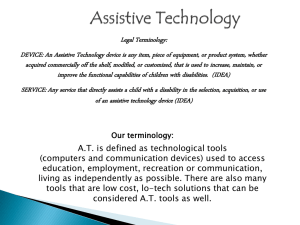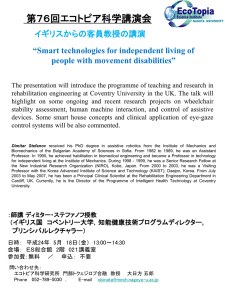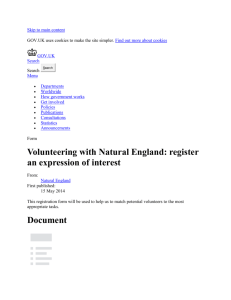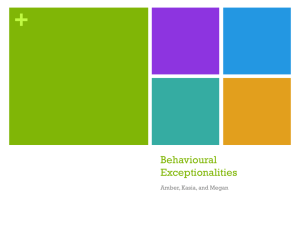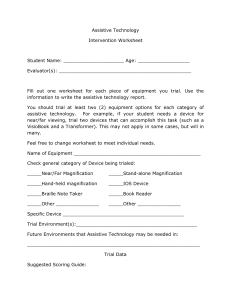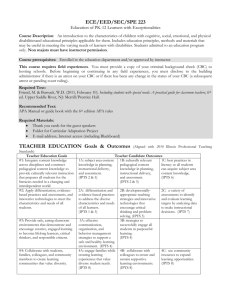Generic_syllabi_at2 - Teacher Education Division
advertisement
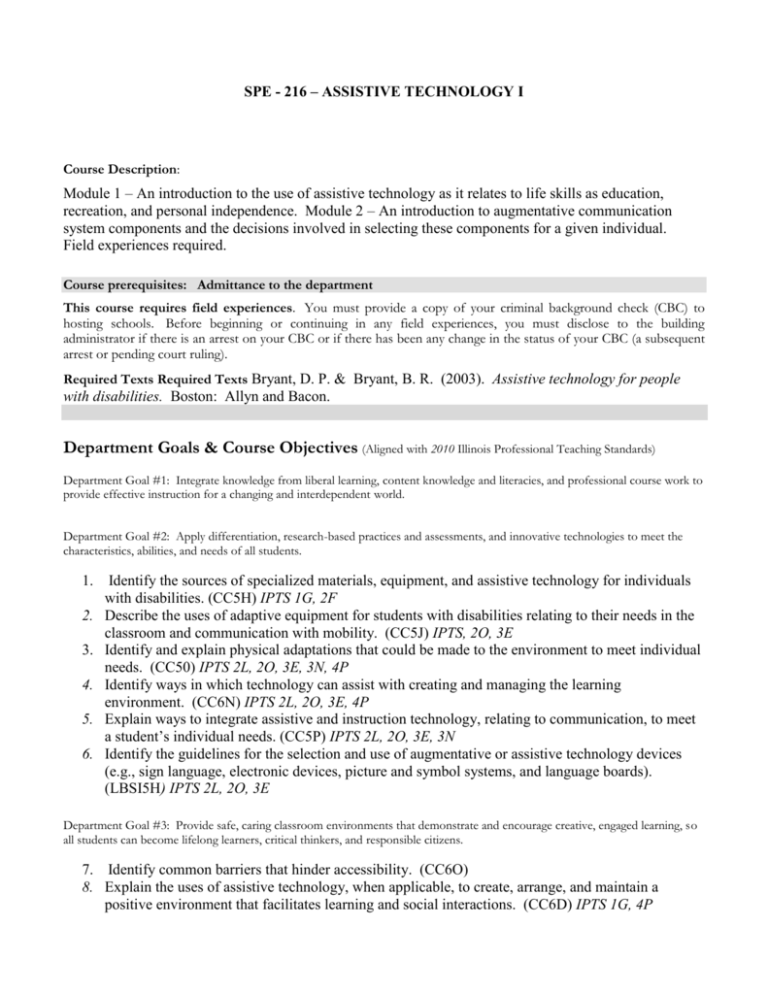
SPE - 216 – ASSISTIVE TECHNOLOGY I Course Description: Module 1 – An introduction to the use of assistive technology as it relates to life skills as education, recreation, and personal independence. Module 2 – An introduction to augmentative communication system components and the decisions involved in selecting these components for a given individual. Field experiences required. Course prerequisites: Admittance to the department This course requires field experiences. You must provide a copy of your criminal background check (CBC) to hosting schools. Before beginning or continuing in any field experiences, you must disclose to the building administrator if there is an arrest on your CBC or if there has been any change in the status of your CBC (a subsequent arrest or pending court ruling). Required Texts Required Texts Bryant, D. P. & Bryant, B. R. (2003). Assistive technology for people with disabilities. Boston: Allyn and Bacon. Department Goals & Course Objectives (Aligned with 2010 Illinois Professional Teaching Standards) Department Goal #1: Integrate knowledge from liberal learning, content knowledge and literacies, and professional course work to provide effective instruction for a changing and interdependent world. Department Goal #2: Apply differentiation, research-based practices and assessments, and innovative technologies to meet the characteristics, abilities, and needs of all students. 1. 2. 3. 4. 5. 6. Identify the sources of specialized materials, equipment, and assistive technology for individuals with disabilities. (CC5H) IPTS 1G, 2F Describe the uses of adaptive equipment for students with disabilities relating to their needs in the classroom and communication with mobility. (CC5J) IPTS, 2O, 3E Identify and explain physical adaptations that could be made to the environment to meet individual needs. (CC50) IPTS 2L, 2O, 3E, 3N, 4P Identify ways in which technology can assist with creating and managing the learning environment. (CC6N) IPTS 2L, 2O, 3E, 4P Explain ways to integrate assistive and instruction technology, relating to communication, to meet a student’s individual needs. (CC5P) IPTS 2L, 2O, 3E, 3N Identify the guidelines for the selection and use of augmentative or assistive technology devices (e.g., sign language, electronic devices, picture and symbol systems, and language boards). (LBSI5H) IPTS 2L, 2O, 3E Department Goal #3: Provide safe, caring classroom environments that demonstrate and encourage creative, engaged learning, so all students can become lifelong learners, critical thinkers, and responsible citizens. 7. Identify common barriers that hinder accessibility. (CC6O) 8. Explain the uses of assistive technology, when applicable, to create, arrange, and maintain a positive environment that facilitates learning and social interactions. (CC6D) IPTS 1G, 4P DEPARTMENT OF EDUCATION 2011 page 2 9. Demonstrate the ability to select and use appropriate technologies to accomplish instructional objectives. (CC5B) IPTS 1G, 2F, 5C Department Goal #4: Empathize, communicate, and collaborate with families of children and youth to connect with school communities in ways that value and respect diversity. Department Goal #5: Act as reflective and ethical professionals who are committed to active collaboration and participation in their schools and in their profession. College and Department Policies The College will make reasonable accommodations for persons with documented disabilities. If you have a disability that may have some impact on your work in this course, please contact Maureen Connolly in the Learning Center. Additional inquiries may be directed to the Vice President for Academic Affairs and the Dean of the Faculty, or to the Chicago Office of the Office of Civil Rights, United States Department of Education. Once the College has documented the disability, you will be directed to initiate and maintain communication with your professor regarding your needs. Incomplete (“I”) grades must be requested in writing by the final class meeting, if you cannot complete the term for emergency reasons. Forms are available from your professor. Completion of field experiences is not considered an emergency. Incompletes must be resolved within three weeks of the end of the term. Late assignments at the time of a request for an Incomplete will incur any late penalty. Students in teacher education programs may not continue in education courses with an Incomplete pending. Academic integrity and dishonesty are clearly defined in the E-Book, as are the professor’s responsibilities and options should academic dishonesty occur. Department of Education Policy states that the minimum penalty for academic dishonesty is an “F” on the assignment. College Policy requires all teacher candidates to self-disclose a criminal history or any pending court hearing to building administrators prior to beginning or continuing field experiences. Candidates may not observe or participate in field experiences until the administrator has given approval and the approval has been confirmed by the program director. The policy is provided in the Guide to Policies and Procedures for Undergraduate and Certification Teacher Education Programs. Violation of this policy will result in a recommendation for dismissal from the teacher education program. Attendance is expected and written documentation is required to make-up a course examination as defined in the College Catalog. Completing field experiences is not a valid reason for being tardy to or absent from class. Department of Education Professional Conduct Guidelines Aligned with Illinois Professional Teaching Standard Professionalism, Leadership, and Advocacy (9H, 9I, 9J, 9Q, 9S, 9T) RESPONSIBILITY Attend class on time and for the entire class period. Complete assignments on time, which is the beginning of class on a due date. Assignments are late if class is not attended or if there are technical problems. Work may not be faxed or emailed to the professor without prior approval. Communicate with the course professor in a timely and appropriate manner. Use office hours or make an appointment to ask individual questions or discuss progress. ETHICS Adhere to professional ethics. Assignments often involve collaboration and the use of multiple resources. Clearly cite ideas from other sources and acknowledge the assistance of others. Portions of assignments used for credit in different courses must be pre-approved by DEPARTMENT OF EDUCATION 2011 page 3 both professors and should be referenced clearly for dual credit on the cover page. Document field experiences accurately and have them verified by a licensed supervising professional. Maintain confidentiality in all field reports and discussions of fieldwork. Fabrication of field hours, experiences, or signatures or failure to notify the College or schools of your criminal background check status are violations of the College’s Academic Integrity Policy. ATTITUDE Demonstrate respect for others and for the opportunity to learn. Active participation is expected during every class meeting. Valuing of diverse ideas and beliefs is expected through courteous debate and dialogue as well as in respectful written evaluation and analysis. Use digital etiquette. Electronic devices should not interrupt class or distract others. Set cell phones to vibrate or turn them off. Electronic tools are to be used for coursework or activities directly related to the class -- not used for entertainment, personal communications, or other coursework during class meetings or in field settings. COLLEGIALITY Demonstrate respect for others and for the opportunity to learn. Give your maximum efforts in promoting equitable group work and completing field experiences. Maintain commitments to classmates and professionals in the field. Demonstrate initiative in collaborating with others, Volunteer your time and share professional resources and responsibilities. Show appreciation for the time and efforts of others. HONOR Complete field experiences in a professional manner. Professional demeanor (e.g., conduct and attire) is expected in school settings. Honor the commitments of hosting professionals by providing details of all course assignments at the beginning of the term. Complete assignments in a professional style. Demonstrate professionalism in formal class presentations. All written work must be word-processed and edited prior to submission. Use APA style. Field Experience Requirements Review the GUIDE TO FIELD EXPERIENCES at http://public.elmhurst.edu/education/1281647.html. Although a course instructor may allow some assignments to be completed in locations that represent a professional conflict of interest (i.e., hours documented on a Field Evaluation and Verification Form), teacher candidates may not document field experiences completed in the school district in which they reside or at schools they attended on their field experience spreadsheets. Field experiences documented on the spreadsheet may not reflect any professional conflicts of interest. Courses in which the instructor requires a specific placement location are the only exception to this requirement. The field experience spreadsheets are used to document the 100 hours (80 hours of which must be participation) for admission to student teaching. Up to 10 field experience hours in private school settings may be counted toward the 100 hours if they are completed with a certified teacher. Some certification programs allow teacher candidates to student teach in private settings (e.g., preschools, special education residential settings), so more hours may be accepted for field work in some private settings because they can serve as potential student teaching placements. Field Experience Reminder: Bensenville #2, Berkeley #87, and Schaumburg #54 do not accept students for any field placements for observation. Elmhurst #205 does not allow more than 15 hours of observation – these hours must be arranged through the Department of Education Satellite Program. Updated Department-wide Grading Scale language. All grading will be completed as objectively as possible. Different sections of this course have common assessments (e.g., rubrics, test specification tables) and use the same number of possible points. "A" ............... 92-100% ......................................... 118-128 points "B" ............... 84-91% ........................................... 108-117 "C" ............... 76-83% ........................................... 98-107 "D" ............... 68-75% ........................................... 88-97 DEPARTMENT OF EDUCATION 2011 page 4 Grades below C (2.0) will not fulfill the Department of Education's requirements for licensure or major in Education. The Department of Education does not use +/- grading. LATE ASSIGNMENT POLICY The maximum point value of a late assignment is the course equivalent of a C+. Late assignments will not be accepted after the last class meeting unless an official Incomplete has been signed by the professor. The maximum value for all late assignments at the time that an Incomplete is requested will be equivalent to a C+ on that course assignment. BLACKBOARD PAGE & E-MAIL COMMUNICATIONS All course assignments, course-related links, documents, the course bibliography, assignment materials, individual grade updates, last minute schedule changes (“announcements”), and so forth may be found by accessing the course’s electronic Blackboard. Professor e-mails will be sent via Blackboard and students should check the page prior to each class meeting. All communications are sent via Blackboard to students’ College e-mail accounts. Course Assignments Evaluation rubrics for major assignments are posted on Blackboard Online Course Participation (Objectives 1-6 – Module 1; Objectives 1-5 – Module 2 IPTS 1G, 2FLO, 3EN, 4P ) Each course participant is expected to participate in the online course every week. Assignments will be posted and course participants are expected to do those assignments and send them to the course instructor by the deadline stated in the assignment description. For each assignment that is not sent to the course instructor by the deadline, there will be a 5 point deduction per day. A complete understanding and synthesis of the course information requires full participation in all online activities that are required of the student. Field Experience Activities (Objectives 2-4, 9 – Module 1, Objectives 2-4, 9 – Module 2 IPTS 1G, 2FLO, 3EN, 4P, 5C) Each student will be responsible for observing at Easter Seals and for interviewing a Speech Pathologist. The observation at Easter Seals needs to be in a setting where Assistive Technology is in use. The interview must be with a Speech Pathologist who is familiar with and using Assistive Technology. The assistive technology program or device can a below, medium, or high tech solution to meet a child’s needs. The student needs to schedule these appointments as soon as the course begins to have time to complete the assignments! Specific guidelines will be given in a class meeting. Weekly Assignments: Module One Week 1 – Questions and Summary – 13 points Week 2 – Questions, Summary and Device Research – 13 points Week 3 – Easter Seals Observation Summary – 20 points Week 4 – Journal Entry – 8 points Module Two – Week 1 – Scavenger Hunt – 8 points Week 2 – Case Study – 10 points; Speech Pathologist Interview – 20 points Week 3 – Questions – 4 points; Case Study – 10 points Week 4 – On-line Summary – 10 points; Article Summary 10 points DEPARTMENT OF EDUCATION 2011 page 5 TENTATIVE COURSE SCHEDULE – Please refer to the Blackboard Calendar for the specific dates for the semester Week One – Two – Three – Four – Topic – Module 1 Define AT, Legal Statues, History Principles of Assistive Technology Assistive Technology Planning Assistive Technology Considerations Week Five – Six – Seven – Eight – Topic Module 2 Assistive Technology for Communication Needs Augmentative Communication Assistive Technology Considerations – Communication Culmination with Article and Reflection Course Bibliography Burgstahler, S. (2001). Universal design of instruction. Retrieved 1/1/05, from http://www.washington.edu/doit/Brochures/Academics/instruction.html Connell, B.R., Jones, M., Mace, R., Mueller, J., Mullick, A., Ostroff, E., Sanford, J., Steinfeld, E., Story, M., & Vanderheiden, G. (1997). The principles of universal design. Raleigh, NC: North Carolina State University, Center for Universal Design. Retrieved 1/1/05, from www.design.ncsu.edu/cud/univ_design/princ_overview.htm Ehren, B.J. (2000). Maintaining a therapeutic focus and sharing responsibility for student success: Keys to in-classroom speech-language services. Language,Speech, and Hearing Services in Schools. 31, 219-229. Fonner, K., and McCloskey, S., Environmental communication training. Presented at the Texas Speech-Language-Hearing Association Annual Convention, April 15-17, 2004, in San Antonio, TX. Lahm, E.A., and Nickels, B.L. (1999). Assistive technology competencies for special educators. TEACHING Exceptional Children, 32, 56-63. Schwab Learning, (2003). Assistive technology guide, Third Edition. Retrieved from www.SchwabLearning.org/atguide Stokes, S. Assistive technology for children with autism. Retrieved 12/09/2004 from http://www.cesa7.k12.us/sped/autism/assist/asst10.htm Thomas, C., and Howerton, D. (2004). Technology for all. New Teacher Advocate, 8-9. Tufte, L., and Maro, J. (1999). Creating literature based communication boards. Retrieved 5/27/2004, from http://www.aacintervention.com/litboards.htm Wepner, S.B., and Bowes, K.A. (2004). Using assistive technology for literacy development. Reading & Writing Quarterly, 20, 219-223. Schwab Learning, (2003).

